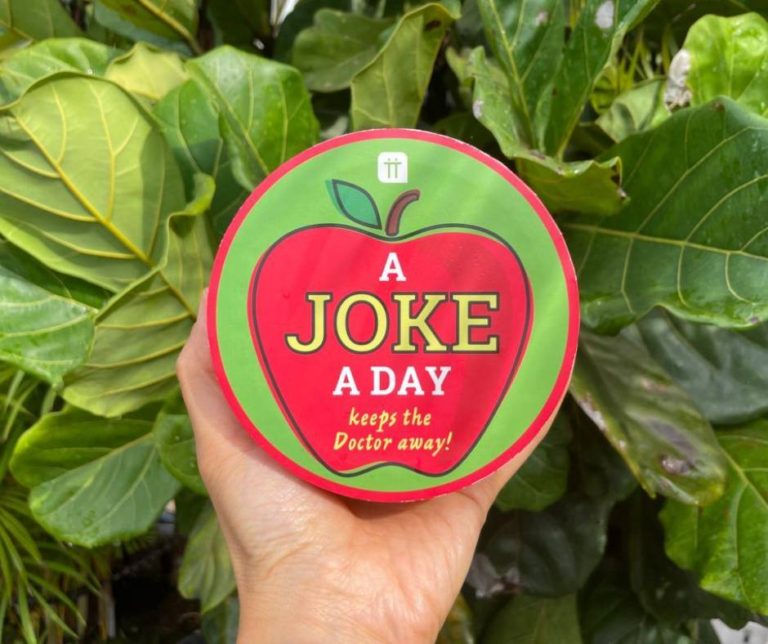Earlier this year, I gave my 8 years old son a box of jokes as a present (featured photo), and since then it has become part of his bedtime routine to read me a joke every night before lights out. We would be laughing our heads off even if it’s a lame joke!
On top of this box reads “A joke a day keeps the doctor away!” It has certainly given us a daily dose of happy vibes and is a great way to connect, ever so important at times of challenges such as the current pandemic.
We have selected some of our favourite ones and included them in your subscription boxes this month as a surprise for your kids and to have a laugh together, perfect as riddles for the upcoming Mid-Autumn Festival too! To those waiting for us to reveal the answers here they are:
Mid-Autumn Riddles in
October Subscription Boxes:
- What do you call a pig that does karate? – A pork chop.
- I’m on a seafood diet. – Every time I see food, I eat it.
- What has to be broken before you can use it? – An egg.
- 五个兄弟,住在一起,名字不同,高矮不齐。(身体部份) – 手指
- 年纪不算大,胡子一大把。不管看见谁,总是叫「妈妈」。(打一动物)- 山羊

Laughter is the shortest distance between two people.
Why humour matters to children?
Humour is what makes something funny, and a sense of humour is the ability to recognise it.
Quoting Andy Cope, an author and ‘happiness expert’ from the UK, “Humour diffuses stress, and creates space for children to come up with solutions, rather than ruminating on problems.” In essence, humour and laughter release feel-good hormones which play a key part in our wellbeing.
Research has also shown that a sense of humour brings many benefits to children and can become a useful tool in life. These include:
- Prompts one to think in different frames of mind and see beyond the surface of things
- Boosts critical thinking skills, creativity and spontaneity
- Develops a growth mindset by allowing children to laugh at mistakes and move on
- Encourages children to be more resilient and to try new things
- Promotes communication skills to be good listeners and speakers
- Captures attention in classrooms, reduces anxiety, encourages group participation and motivation leading to better school performance
The good news is a sense of humour can actually be developed and encouraged in children as they grow up, as it is not something that children are born with.
What can you do to encourage your child’s sense of humour?
Although a young child may not understand jokes and riddles, they actually start to develop a sense of humour at a very young age. Do you remember the smile on your baby’s face when you blow raspberries, play peek-a-boo, or do silly things such as tearing up a tissue paper over and over? These joyful moments all sow seeds to help children to develop a playful and humorous attitude about life.
Remember your child’s humour will change over time so take cues from your child to know what is likely to amuse them as they grow. Jokes should be age-appropriate and related to things they are familiar with for them to understand them, and most won’t understand sarcasm until they are older.
Create a humour rich environment for your kids. One of the easiest ways is to surround them with funny books. These could range from picture books to rhymes, joke books and comics. A big part of the funniness lies in how you deliver the reading – add your own sound effects and different character voices; be as dramatic and creative as you want to bring the story to life – use items from home as props and costumes! Funny TV shows and movies are great too for older kids, help your child choose and enjoy them together!
Other quick tips:
- Use humour yourself – kids are great imitators.
- Encourage toddler humour by being spontaneous and playful.
- Enjoy the jokes together, have a laugh even if they mix up jokes (or if it’s not funny to you..)!
- Maintain a supportive and warm atmosphere at home that accepts mistakes – a child who lacks confidence and self-esteem is less likely to appreciate or create humour.
- Know when to draw the line – don’t laugh at mean-spirited jokes and spend time explaining to your child why that joke isn’t funny.
We now know that humour matters to children, but in fact, humour is equally important to adults too! As caregivers to our own children, we need to be in a healthy state of wellbeing in order to take good care of the people around us. As many would agree, life is so much easier with a sense of humour.
How about starting today, have some funny moments with your child every day and enjoy laughing together!





